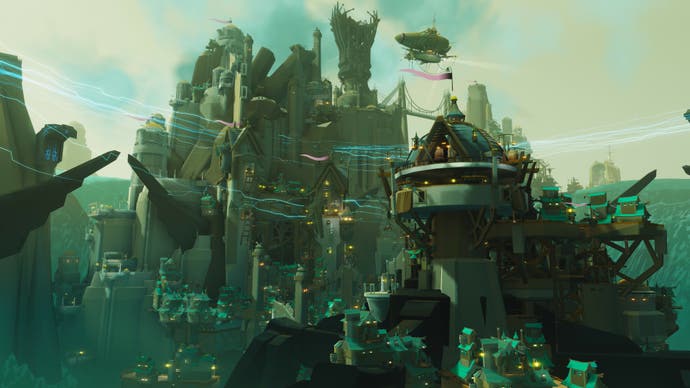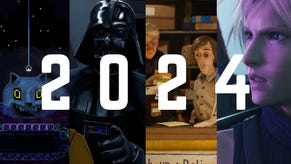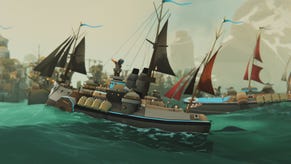"Consciously, everything I make is about to tip over": Precarious creativity and Bulwark's evolving demo
"I just want you to be Bob Ross."
In a shed behind his house, Tomas Sala is building an ocean. Oceans are his thing, of course, and he's built them before. But the shed is new. Last time I saw Sala on a Zoom screen he was working on his debut game, The Falconeer, and working from an attic whose floors were strewn with toys discarded by Sala's newborn baby. Today, he's working on a follow-up, Bulwark: Falconeer Chronicles. Bulwark is set in the same watery world as The Falconeer but instead of being an airborne action game it's something more city-builderish. Emphasis on the ish. Genre is a wonderful problem here. But anyway, that shed!
'I'm living the Roald Dahl lifestyle,' Sala tells me. 'Working from my garden. Which is just smashing.'
The game Sala's building isn't just a very different genre to The Falconeer. It's a very different way of putting a game out into the world. That's very much on purpose. Rather than aiming for a distant release date, Sala's already put Bulwark up on Steam in the form of what he calls an 'Evolving demo'. It's free to play. It changes over time. Sala adds and subtracts and can explore feedback.
My worry for Sala is that this takes the marathon of finishing a game and just extends it - a marathon that never ends, but also never changes pace. Turns out I'm absolutely wrong about that.
'Honestly,' Sala tells me, 'The Falconeer was a hit and miss in some places, but we pulled through and made enough money that for the first time I have no direct money stresses, right?' He thinks about that thought for a second and adjusts it. 'I'll have money stresses in two years, let's put it like that.'
And that's a great position to be in when you're making something? 'It's like unlocking a part of your brain,' Sala laughs. 'It's just opens up to do functional stuff, instead of worrying about money. Just less money stress! It's just, holy shit! It's like billionaires do one hit after the other? It's because they have all this available brainspace. "Oh, let's do this, oh, yeah." That's, that's how it works. They have no stress!'
This was not Sala's state of mind when I last saw him. By the end of The Falconeer, 'I was gutted,' Sala says. He got COVID, he sent out the final press build. He fixed a bug and made the AI 'killer'. The press loved the difficulty of the game, its uncompromising nature, but Sala had just intended to make something casual, some kind of light entertaining thing.
'And that was stress compounding,' he says. 'And then it's an Xbox launch title. And afterwards, because it wasn't an instant success, financially, on Steam, for instance, I had to work for a year non-stop.' He pauses. 'That was the marathon, because you thought you were gonna be done and had some time for the kids.' Instead? 'Okay, now you're going to update, fix it up, be the loving developer. So I did that till I couldn't do it anymore.
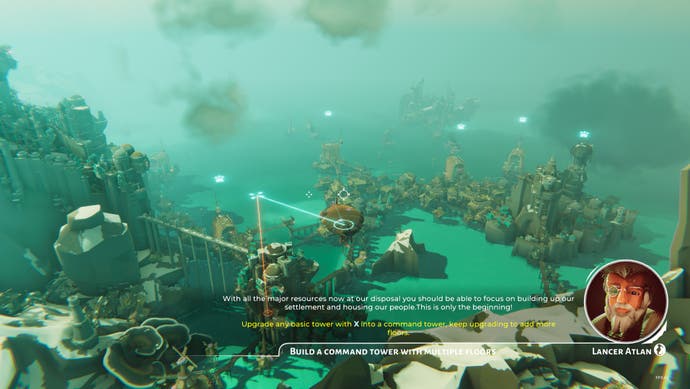
'When you put a book out you know, what are people going to think?' he says. 'Is it gonna do what I wanted to do? Those thoughts are a weight that comes down towards the end. Everything is potential. It's fantastic. Your launch is gonna be great. Awesome. It's your creative bubble. And then you have to go out and that's where the rubber hits the road. You have the tunnel vision where you can't objectively see things. Reality hits. At the end, I could still do it all. But I was a machine. I was living on the ideas I instigated a year earlier. Polishing, just being an automaton on professionalism and not much else, which is how I got into burnout initially.'
Enter the evolving demo. It is, in part, an attempt to take the stress out of making a game, to manage the feedback, to make sure that everybody, in Sala's phrase, 'can piss over it in stages.'
But it's also, I think, an acknowledgement that Bulwark is an unusual game, and unusual games bring unusual challenges with them. Sala tells me that when he released the demo in January, he thought, 'Well, I'm made something easy to understand.' It was a city builder, but strung across the encrusted archipelagos of the Falconeer's ocean world. And it had an unusual interface, in which you could move in the air or on the ground, but when you were on the ground you hopped from one building to the next rather than simply shifting the camera. If you ask me, this is genius: it feels like progress is tactile, like you're clawing your way towards having an outpost in an inhospitable world. But it is, well, unusual.
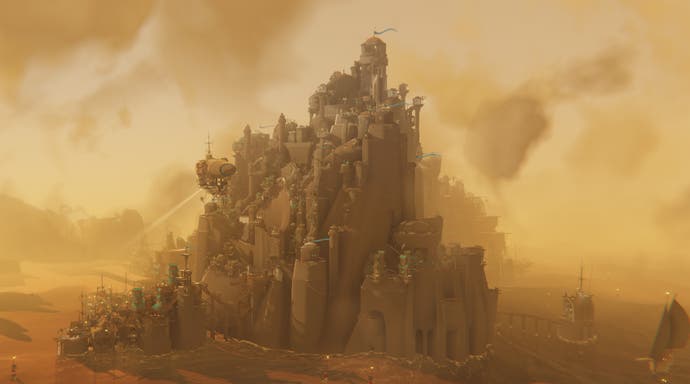
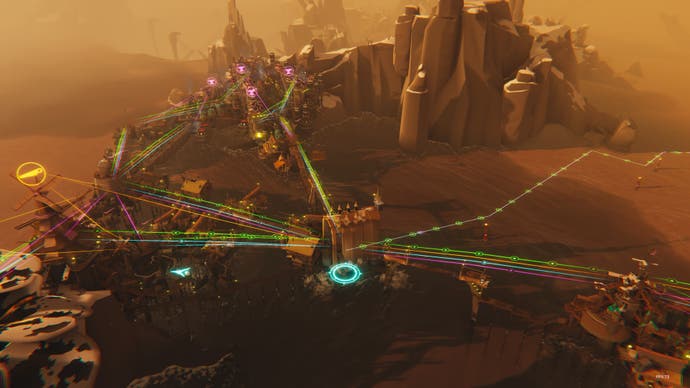
'People went, "Ah, I've been playing this game for twenty years, muscle memory!" You know, "Why are you breaking these perfectly fine conventions on how WASD cameras in builders work?"' Sala laughs. 'But that's fine! I still have time to fix that and get used to the idea I'm making another idiosyncratic weird thing that some people like, some don't.
'And that's actually working for me,' he continues. 'I get to interact, I get to respond, get to improve the game. Polish! When you make something that's apparently weird to some people or it's not intuitive because it's not like everything else? You had better make sure it's polished as heck. You need to make that transition to, "Hey, you're going to have to adapt a little bit" as smooth as possible.' He trails off for a second. 'You want to please everybody. You want to connect with everyone. And when you can't, it hurts. And I've not found a way out of it, except to sort of piecemeal feed myself that process.'
It's interesting to hear Sala say this, because one of the counterintuitive things I took away from The Falconeer was that an idiosyncratic game actually seemed easier for a lot of people to love. It was a flying game, but it had tons of lore, endless world-building, a strange, evocative world and a sense that something deep in the design could never be entirely tamed. And yet people embraced it. And they embraced it, I think, because they had to come to meet Sala where he was a little bit. They had to step across towards Sala and his idea of what the game should be.
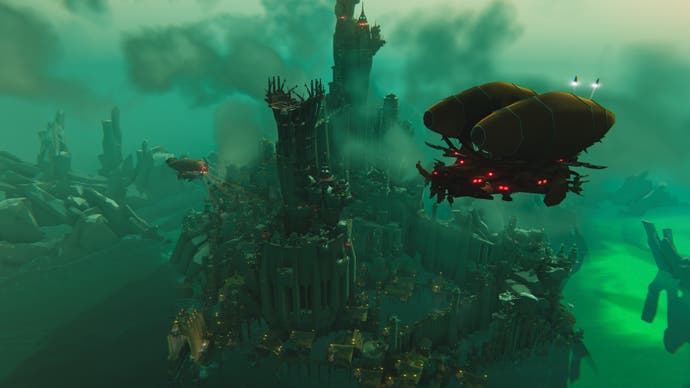
'Well, you have to become me,' Sala says immediately. 'This is my problem in life. Because [my partner] said, what's the most fun you had? Ah, making the little towns. Okay, why don't you turn people into you? So like, a city builder? That's easily accessible, it's a popular genre that can make more money. So I made a demo last year or Yeah, I think, a year and a half ago, put it on Twitter, with the little mechanic. And it was super different. It's just one two mouse clicks. It's like, okay, this is going to be my accessible game for everybody.'
And then? 'And then I keep adding on stuff,' Sala laughs. 'And at the end, okay, apparently, not everybody has spent 30 years making 3D art and using 3D modeling software. Not everyone can rotate and orbit around stuff. So again, I've made something which is... It's because I'm by myself. I can't move towards the player.'
Sala makes it sound chaotic. But it doesn't feel chaotic to play Bulwark. It just feels different: like we're on a game design Galapagos, learning different responses to very basic design questions, learning a different path towards beauty. Why shouldn't a game start with the creator addressing you personally? Why shouldn't the spaces of the game be wild oceans, deep and dense and completely inhospitable? Why shouldn't the cursor be a zeppelin that slowly pootles through the clouds, moving a little slower than your ideas and your intentions, giving you space to finesse, to rethink, to become Sala.
And within this design, there's plenty of conscious thought. 'So there's things I want,' Sala agrees. 'I didn't want an interface that's a layer on top of the game. Because I have this theory that we're making games to turn people into enjoyment machines, right? And games where people are more engaged in being effective. So if you take something like Factorio or even Age of Wonders, it's overwhelming. It's all about controlling the machine, and it does become sort of a grind, basically, grinding your way through it. And that is very satisfying for some people, but I don't think that's the place where I want to be.
'And when you have a mouse, and when you click on the screen, when you're clicking on a layer on top of the screen. you're also not in the game,' he continues. 'And when you use a controller, as someone said, controllers like playing a guitar? And when I heard that I thought that was super interesting, because you're not looking at what you're doing. your fingers are doing it based on what you feel.' A pause. 'I can't get rid of everything, but for the core games I want you to be in the game. Because then it's not about controlling the machine. You're in the world, you're living it, you're building it, you're hopefully being creative, in this chaotic way like I'm creative.'
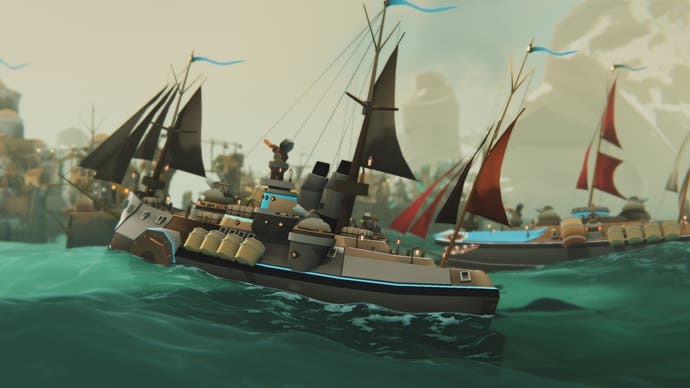
Sala defines this kind of creativity as being engaged, I think. Being engaged beyond the point where you're solving puzzles or thinking about collecting resources. It's deeper than that, but also simpler. 'It's merely: what happens if I do this? Or, you know, look at this little cove, I can make little pirates.' He laughs. 'I just want you to be Bob Ross. Honestly. Because that's a valid, authentic creative experience which I enjoy.'
The other part of this is that, as pretty much a one-man studio, there's plenty of stuff he simply can't do. He tells me he can't make a beautiful, animated Age of Wonders interface because the usability testing would be horrific for a single person. A free-roaming camera would break his simple interaction system. So he creates what he calls shortcuts. He has a zeppelin already, so that's the way they can fly around and explore. That's his solution.
And between the conscious design and the shortcuts, the game emerges. 'It is a Tomas Simulator,' he says. 'It's my limitations and where I want to be and my struggle to get to, to, to that part.' The game is a reflection of the designer? 'That's why it clicks with some people,' he laughs. 'Because I'm a human being they'll dive into it and get fascinated by things.'
When I first played Bulwark - I still feel each time I load it up that I'm playing it for the first time - I was struck by the sense that Sala was saying that survival is precarious. It's a city builder, sure, but where's the space to build? There are no broad expanses for streets and squares and tidy civic life. Instead you encrust yourself on these spars of stone that emerge from the thrashing sea. You wriggle up them, clamp towers to them, and send rickety walkways stretching out to factories and resources. City builders are often about the design you impose on the landscape - I'm always reminded of the narrator of Iain Banks' Complicity who always makes his main city in the shape of his own initials - but with Bulwark, what you get is a civilisation that is built upon, and in many ways underlines, the structures in nature that allow it to exist in the first place.
So survival is precarious. But is that really what Bulwark is getting at? The more I talk to Sala the more I realise it might go a bit deeper. The more I listen to Sala the more I realise he's saying that creativity is precarious. You build something and it's rickety, but it's rickety because it's a negotiation with so many other variables. So much of Bulwark is essentially reinforcing, so much is gantry-work. You take something you've made and stabilise it, moving it from wood to stone, adding buttresses and platforms and shoring it up. And all the while the sea is all around you, not to mention other civilisations growing out there. The sea is all around and it churns and threatens to wash you away and it cannot be denied. You can build harbours, sure, but they need to be in deep water and their routes need a decent captain. Everything is a negotiation. And that's why Bulwark's form of creativity feels richer - and feels, in a way, more real.
'Consciously,' Sala says, 'everything I make is about to tip over.' He laughs. 'I've seen that myself. There's a tweet that I've read about unstable design. By nature it's so interesting. In a game, if you make something too solid, it's not interesting. It doesn't push you around, you know, when you're walking through the forest, and there isn't the tree about to fall over? There's an excitement in that we need to be pulled into the game if games have this extra, you know...' He hunts for the word. 'This extra seduction we need. But seduction can also be fear. It's the way every castle needs to be on the peak, right at the point where it's about to fall over.'
Ultimately, for Sala, creativity is precarious because it's so closely linked to exploring, an idea he returns to quite a lot. 'Creativity is messy for me,' he says. 'It's going in there and seeing what happens. It's stirring the kettle forever and ever. There's a lot going on and you're adding more and it's a mess, but it's my mess. You are entering a place where chaotic creativity is appreciated.'
At the end of our chat, just before I'm about to leave him in his shed to get back to the ocean he's building, he returns to Bob Ross. 'Bob Ross is not a joke,' he says. 'You watch Bob Ross. And it's pushing paint around. But anything can be anything. That's just a little bit of skill, or just that you dare to do it.' He leans forward now, it seems, warming to this idea. 'Because it's not even the skill. It's just: are you going to do this?
'It's the point I had to teach myself. When you first learn to draw or or do anything creatively, you make something nice. And then you don't want to fuck it up. You actually want to wrap it up and it's done. But the real work is when we say, okay, fuck it, we're going to get out the paintbrush and go back in, and go over it.
'And sometimes you fuck up. And sometimes you get somewhere nicer. And you keep going and you try to get rid of the fear of breaking the nice things you have.' His eyes gleam on the monitor of my computer. 'You keep going, just to find out what's there.'
